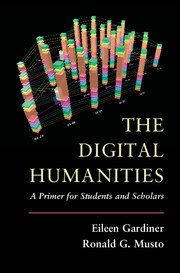Book contents
- Frontmatter
- Contents
- List of Illustrations
- Preface and Acknowledgments
- 1 Introduction to the Digital Humanities
- 2 The Organization of Humanities Research
- 3 The Elements of Digital Humanities: Text and Document
- 4 The Elements of Digital Humanities: Object, Artifact, Image, Sound, Space
- 5 Digital Tools
- 6 Digital Environments
- 7 Publication: Prerelease, Release and Beyond
- 8 The Meta-Issues of Digital Humanities 1
- 9 Meta-Issues 2: Copyright and Other Rights, Digital Rights Management, Open Access
- 10 The Evolving Landscape for the Digital Humanities
- Epilogue: The Half-Life of Wisdom
- Appendix: Digital Tools
- Notes
- Glossary
- Bibliography on Digital Humanities
- Index
3 - The Elements of Digital Humanities: Text and Document
Published online by Cambridge University Press: 05 July 2015
- Frontmatter
- Contents
- List of Illustrations
- Preface and Acknowledgments
- 1 Introduction to the Digital Humanities
- 2 The Organization of Humanities Research
- 3 The Elements of Digital Humanities: Text and Document
- 4 The Elements of Digital Humanities: Object, Artifact, Image, Sound, Space
- 5 Digital Tools
- 6 Digital Environments
- 7 Publication: Prerelease, Release and Beyond
- 8 The Meta-Issues of Digital Humanities 1
- 9 Meta-Issues 2: Copyright and Other Rights, Digital Rights Management, Open Access
- 10 The Evolving Landscape for the Digital Humanities
- Epilogue: The Half-Life of Wisdom
- Appendix: Digital Tools
- Notes
- Glossary
- Bibliography on Digital Humanities
- Index
Summary
INTRODUCTION
With the advent of digital scholarship, humanists are increasingly using both traditional materials and those previously considered outside the parameters of their disciplines. This brings with it an opportunity for richer and more collaborative types of scholarship. By describing the variety of elements that one can incorporate into digital research, the following two chapters hope to explore the scope and boundaries of traditional disciplinary considerations. Our discussions will also link these elements with tools that incorporate this material into digital scholarship.
HUMANITIES DATA
At this point, it is important to reiterate one of our initial distinctions: while physical scientists draw their data from the natural world and social scientists from human groupings, humanists draw their information from the world created by humans: most concretely from historically created objects, but also from the record of human discourse either about that record or about human discourse itself. Thus humanities data might be about the record of events – what we commonly call facts – or about the texts created about them, whether these texts are written, oral, visual, aural or spatial. Humanists have therefore tended to talk more about texts or cultural and artistic objects; but now under the impact of the digital, a certain leveling of language tends to group all these under the rubric of “data.”
The Merriam-Webster Dictionary defines data as “factual information (as measurements or statistics) used as a basis for reasoning, discussion, or calculation.” More broadly, however, data can be the individual fact or event, statistics drawn from data points or other items of information: visual, aural or physical evidence amenable to collection, analysis and exposition. While we tend to think of “data” in terms of the physical and social sciences, humanities scholars also work with data, most often with reference to the first two functions of the above definition: reasoning and discussion. While humanities data might not always be as succinct and number friendly as the data of the sciences, often it can be just that.
- Type
- Chapter
- Information
- The Digital HumanitiesA Primer for Students and Scholars, pp. 31 - 42Publisher: Cambridge University PressPrint publication year: 2015



